Trapping Zero Read online
Page 6
“Sara!” Reid skidded to a halt. He unclasped his boots in seconds and ran over the powder to her. “Sara, are you okay?” She had just gotten her cast off; the last thing she needed was another injury to ruin her vacation.
He knelt and turned her over. Her face was red and there were tears in her eyes—but she was laughing.
“Are you okay?” he asked again.
“Yeah,” she said between giggling fits. “I’m fine.”
He helped her to her feet and she wiped tears from her eyes. He was more than just relieved that she was okay—the sound of her laughter was like music to his soul.
“You sure you’re okay?” he asked a third time.
“Yes, Dad.” She sighed happily and steadied herself on her skis. “I promise I’m okay. Nothing broken. By the way…” She pushed off with both poles and sent herself careening quickly down the slope. “We’re still racing, right?”
From nearby, Maya laughed too and set off after her sister.
“Not fair!” Reid called after them as he scrambled back to his skis.
After three hours of riding the slopes, they returned to the lodge and found seats in the large common area, in front of a roaring fireplace large enough to park a motorcycle in. Reid ordered three mugs of Swiss hot chocolate, and they sipped contentedly before the fire.
“I want to try a blue trail tomorrow,” Sara announced.
“Are you sure, Squeak? You just got that cast off your arm,” Maya taunted.
“Maybe in the afternoon we can check out the town,” Reid offered. “Find a place to have dinner?”
“That sounds fun,” Sara agreed.
“Sure, you say that now,” Maya said, “but you know he’s going to make us check out that monastery.”
“Hey, it’s important to get to know the history of a place,” said Reid. “That monastery was what started this town. Well, up until the 1850s, when it became a vacation spot for tourists seeking what they called ‘fresh air cures.’ You see, back then…”
Maya leaned back in her chair and pretended to snore loudly.
“Ha-ha,” Reid mocked. “Fine, I’ll stop lecturing. Who needs a refill? Be right back.” He scooped up the three mugs and headed towards the counter for more.
As he waited, he couldn’t help but mentally pat himself on the back. For the first time in a while, maybe even since the memory suppressor was removed, he felt that he’d done right by his girls. They were all having a great time; the events of the month prior already seemed to be becoming distant memory. He hoped it was more than just temporary, and that the creation of new, happy memories would shove out the anxiety and anguish of what had happened.
Of course, he wasn’t so naïve to believe that the girls would simply forget about the incident. It was important not to forget; just like history, he didn’t want the opportunity for it to repeat itself. But if it got Sara out of her melancholy funk and Maya back on track with school and her future, then he would feel he did his job as a parent.
He returned to their sofa to find Maya jabbing away at her cell phone and Sara’s seat empty.
“Went to the bathroom,” Maya said before he could even ask.
“I wasn’t going to ask,” he said as nonchalantly as he could, setting down the three mugs.
“Yeah, right,” Maya teased.
Reid straightened and looked around anyway. Of course he was going to ask; if it was up to him, neither of the girls would leave his sight. He glanced about, past the other tourists and skiers, the locals enjoying a hot drink, the staff serving patrons…
A knot of panic tightened in his stomach as he spotted the back of Sara’s blonde head across the lodge floor. Behind her was a man in a black parka, following her—or perhaps guiding her away.
He strode over quickly, fists balling at his side. His first thought was immediately of the Slovakian traffickers. They found us. His tense muscles were ready for a fight, ready to take this man apart in front of everyone. Somehow they found us here, in the mountains.
“Sara,” he said sharply.
She stopped and turned, her eyes wide at his commanding tone.
“You okay?” He looked from her to the man following her. He had dark eyes, a five o’clock shadow, ski goggles perched on his forehead. He didn’t look Slovakian, but Reid was not taking any chances.
“Fine, Dad. This man asked me where the bathrooms were,” Sara told him.
The man put up both hands defensively, palms out. “I’m very sorry,” he said, his accent sounding German. “I did not mean any harm—”
“You couldn’t have asked an adult?” Reid said forcefully, staring the man down.
“I asked the first person I saw,” the man protested.
“And that was a fourteen-year-old girl?” Reid shook his head. “Who are you with?”
“With?” the man asked in bewilderment. “I’m… with my family here.”
“Yeah? Where are they? Point them out,” Reid demanded.
“I-I don’t want any trouble.”
“Dad.” Reid felt an arm tug at his. “That’s enough, Dad.” Maya tugged at him again. “He’s just a tourist.”
Reid narrowed his eyes. “I’d better not see you around my girls again,” he warned, “or there will be trouble.” He turned away from the frightened man as Sara, bewildered, headed back towards the sofa.
But Maya stood in his path with her hands on her hips. “Just what the hell was that?”
He frowned. “Maya, you watch your language—”
“No, you watch yours,” she shot back. “Dad, you were speaking German just now.”
Reid blinked in surprise. “I was?” He hadn’t even realized it, but the man in the black parka had apologized in German—and Reid had simply picked it up without thinking.
“You’re going to freak Sara out again, doing things like that,” Maya accused.
His shoulders slackened. “You’re right. I’m sorry. I just thought…” You thought the Slovakian traffickers had followed you and your girls to Switzerland. Suddenly he recognized how ridiculous that sounded.
It was clear that Maya and Sara were not the only ones that needed to recover from their shared experience. Maybe I need to schedule a few sessions with Dr. Branson, he thought as he rejoined his daughters.
“I’m sorry about that,” he told Sara. “I guess I’m just a little overprotective right now.”
She said nothing in response, but stared at the floor with a faraway look in her eye, both hands wrapped around a mug as it grew cold.
Seeing his reaction and hearing him bark angrily at the man in German had reminded her of the incident and, if he had to guess, just how little she knew about her own father.
Great, he thought bitterly. Not even one day in and I’ve already ruined it. How am I going to fix this? He took a seat between the girls and desperately tried to think of something he could say or do to return to the cheerful atmosphere of only moments ago.
But before he had the chance, Sara spoke up. Her gaze lifted to meet his as she murmured, and despite the conversations around them Reid heard her words clearly.
“I want to know,” his youngest daughter said. “I want to know the truth.”
CHAPTER SEVEN
Yosef Bachar had spent the last eight years of his career in perilous situations. As an investigative journalist, he had accompanied armed troops into the Gaza Strip. He had trekked across deserts in search of hidden compounds and caves during the long hunt for Osama bin Laden. He had reported from the midst of firefights and air raids. Not two years earlier, he had broken the story of Hamas smuggling drone parts across borders and forcing a kidnapped Saudi engineer to reconstruct them so they could be used for bombings. His exposé had inspired higher security at borders and increased awareness of insurgents seeking better technology.
Despite all he had done to risk life and limb, he had never found himself in more danger than he was in now. He and two Israeli colleagues had been covering the story of Imam Khalil and
his small sect of followers, who had unleashed a mutated smallpox virus on Barcelona and attempted to do the same on the United States. A source in Istanbul told them that the last few of Khalil’s zealots had fled to Iraq, hiding somewhere near Albaghdadi.
But Yosef Bachar and his two compatriots did not find Khalil’s people; they had not even reached the city before their car was run off the road by another group, and the three journalists were taken hostage.
For three days they had been kept in the basement of a desert compound, bound at the wrists and kept in the dark, both literally and figuratively.
Bachar had spent those three days waiting for their inevitable fate. These men were most likely Hamas, he realized, or some offshoot thereof. They would torture and eventually murder him. They would record the ordeal on video and send it to the Israeli government. Three days of waiting and wondering, dozens of horrid scenarios playing out in Bachar’s head, felt just as tortuous as whatever plans these men had for them.
But when they finally did come for him, it was not with weapons or implements. It was with words.
A young man, not twenty-five if he was a day, entered the subterranean level of the compound alone and turned on the light, a single bare bulb in the ceiling. He had dark eyes, a beard trimmed short, and broad shoulders. The young man paced before the three of them, on their knees with hands bound in front of them.
“My name is Awad bin Saddam,” he told them, “and I am the leader of the Brotherhood. The three of you have been conscripted into a most glorious purpose. Of you, one will deliver for me a message. Another will document our holy jihad. And the third… the third is unnecessary. The third will die at our hands.” The young man, this bin Saddam, paused his pacing and reached into his pocket.
“You may decide who will carry out which task between yourselves if you wish,” he said. “Or, you may leave it to chance.” He bent at the waist and placed three thin lengths of twine on the floor before them.
Two of them were approximately six inches long. The third was trimmed a couple inches shorter than the others.
“I will return in half an hour.” The young terrorist left the basement and locked the door behind him.
The three journalists stared at the trimmed, fraying lengths of rope on the stone floor.
“This is monstrous,” said Avi quietly. He was a stout man of forty-eight years, older than most still working in the field.
“I will volunteer,” Yosef told them. The words spilled from his mouth before he thought them through—because if he did, he would likely hold them behind his tongue.
“No, Yosef.” Idan, the youngest of them, shook his head firmly. “It is noble of you, but we couldn’t live with ourselves knowing that we allowed you to volunteer for death.”
“You would leave it up to chance?” Yosef countered.
“Chance is fair,” said Avi. “Chance is unbiased. Besides…” He lowered his voice as he added, “This may be a ruse. They may still yet kill all of us anyhow.”
Idan reached down with both bound hands and scooped the three spans of rope in his fist, gripping them so that the exposed ends appeared to be the same length. “Yosef,” he said, “you choose first.” He held them out.
Yosef’s throat was too dry for words as he reached for an end and slowly pulled it from Idan’s fist. A prayer ran through his head as an inch, then two, then three unfurled from his enclosed fingers.
The other end fell free after only a few short inches. He had drawn the short rope.
Avi heaved a sigh, but it was one of despair, not of relief.
“There you have it,” said Yosef simply.
“Yosef…” Idan began.
“The two of you can decide between yourselves which task you will take,” Yosef said, cutting off the younger man. “But… if either of you make it out of this and return home, please tell me wife and son…” He trailed off. Final words seemed to fail him. There was nothing he could convey in a message that they would not already know.
“We will tell them you boldly faced your fate in face of terror and iniquity,” Avi offered.
“Thank you.” Yosef dropped the short length to the ground.
Bin Saddam returned a short time later, as he had promised, and again paced before the three of them. “I trust you have come to a decision?” he asked.
“We have,” said Avi, looking up into the face of the terrorist. “We have decided to adopt your Islamic concept of hell just so that we have a place to believe you and your bastard lot will end up.”
Awad bin Saddam smirked. “But which of you will go before me?”
Yosef’s throat still felt parched, too dry for words. He opened his mouth to accept his fate.
“I will.”
“Idan!” Yosef’s eyes bulged wide. Before he could say anything, the younger man had spoken up. “No, it is not him,” he told bin Saddam quickly. “I drew the short rope.”
Bin Saddam looked from Yosef to Idan, seemingly amused. “I suppose I will just have to kill the one who opened his mouth first.” He reached for his belt and unsheathed an ugly, curved knife with a handle made from a goat’s horn.
Yosef’s stomach turned at the mere sight of it. “Wait, not him—”
Awad flicked his knife out and across Avi’s throat. The older man’s mouth fell open in surprise, but no sound came forth as blood cascaded down from his open neck and spilled onto the floor.
“No!” Yosef shouted. Idan squeezed his eyes shut as a piteous sob burst from him.
Avi fell forward onto his stomach, faced away from Yosef as a pool of dark blood seeped across the stones.
Without another word, bin Saddam left them there once again.
The two remaining endured that night without sleep and not a single word passing between them, though Yosef could hear the soft sobs of Idan as he mourned the loss of his mentor, Avi, whose body laid mere feet from them, growing ever colder.
In the morning three Arabic men entered the basement wordlessly and removed Avi’s body. Two more came immediately after, followed by bin Saddam.
“Him.” He pointed to Yosef, and the two insurgents roughly hauled him to his feet by the shoulders. As he was dragged towards the door he realized that he might never see Idan again.
“Be strong,” he called over his shoulder. “God be with you.”
Yosef squinted in the harsh sunlight as he was dragged into a courtyard surrounded by a high stone wall and thrown unceremoniously into the back of a truck, the bed covered by a dome of canvas. A burlap bag was yanked over his head, and once again he found himself plunged into darkness.
The truck rumbled to life and out of the compound. Which direction they were traveling in, Yosef could not tell. He lost track of how long they had been driving and the voices from the cab were hardly distinguishable.
After a while—two hours, perhaps three—he could hear the sounds of other vehicles, engines roaring, horns honking. Beyond that were street vendors hawking and civilians shouting, laughing, conversing. A city, Yosef realized. We are in a city. What city? And why?
The truck slowed and suddenly a harsh, deep voice was directly in his ear. “You are my messenger.” There was no mistaking it; the voice belonged to bin Saddam. “We are in Baghdad. Two blocks to the east is the American embassy. I am going to release you, and you are going to go there. Do not stop for anything. Do not speak to anyone until you arrive. I want you to tell them what happened to you and your countrymen. I want you to tell them that it was the Brotherhood that did this, and their leader, Awad bin Saddam. Do this and you will have earned your freedom. Do you understand?”
Yosef nodded. He was confused at the content of such a simple message and why he had to deliver it, yet eager to be free of this Brotherhood.
The burlap bag was torn from over his head, and at the same time he was shoved roughly from the back of the truck. Yosef grunted as he hit the pavement and rolled. An object sailed out behind him and landed nearby, something small and brown and rectangula
r.
It was his wallet.
He blinked in the sudden daylight, passers-by pausing in astonishment to see a man bound at the wrists thrown from the back of a moving vehicle. But the truck did not stop; it rolled on and vanished into the thick afternoon traffic.
Yosef grabbed his wallet and got to his feet. His clothes were filthy and soiled; his limbs ached. His heart broke for Avi and for Idan. But he was free.
He staggered down the block, ignoring stares from citizens of Baghdad as he headed towards the US embassy. A large American flag guided his way from high upon a pole.
Yosef was about twenty-five yards from the tall chain-link fence that surrounded the embassy, topped in barbed wire, when an American soldier called out to him. There were four of them posted at the gate, each armed with an automatic rifle and in full tactical gear.
“Halt!” the soldier ordered. Two of his comrades leveled their guns in his direction as the dirty, bound Yosef, half-dehydrated and sweating, stopped in his tracks. “Identify yourself!”
“My name is Yosef Bachar,” he called back in English. “I am one of three Israeli journalists that were kidnapped by Islamic insurgents near Albaghdadi.”
“Call this in,” the commanding soldier told another. With two guns still trained on Yosef, the soldier approached him warily, his rifle cradled in both arms and a finger on the trigger. “Put your hands on your head.”
Yosef was frisked thoroughly for weapons, but the only thing the soldier found was his wallet—and inside it, his identification. Calls were made, and fifteen minutes later Yosef Bachar was admitted entrance to the US embassy.
The ropes were cut away from his wrists and he was ushered into a small and windowless office, though not uncomfortable. A young man brought him a bottle of water, which he chugged gratefully.
A few minutes later, a man in a black suit and matching combed hair entered. “Mr. Bachar,” he said, “my name is Agent Cayhill. We’ve been aware of your situation, and we’re very glad to see you alive and well.”

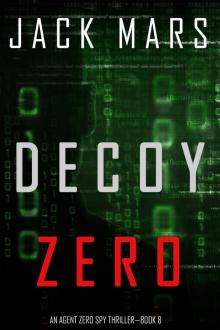 Decoy Zero
Decoy Zero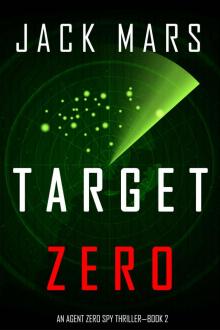 Target Zero
Target Zero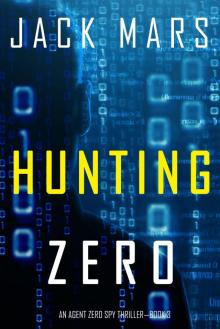 Hunting Zero
Hunting Zero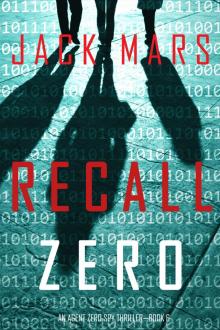 Recall Zero
Recall Zero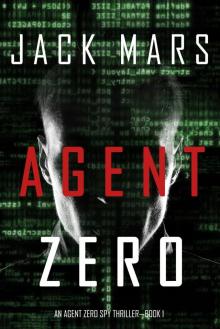 Agent Zero
Agent Zero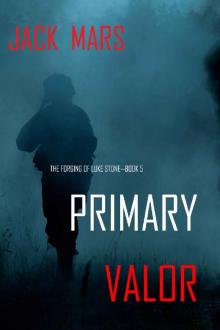 Primary Valor
Primary Valor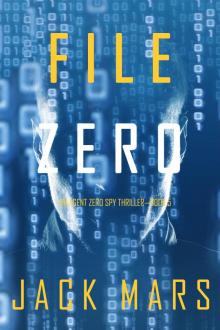 File Zero
File Zero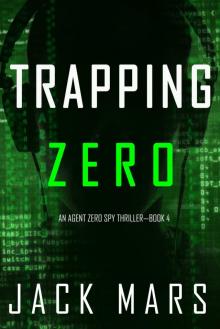 Trapping Zero
Trapping Zero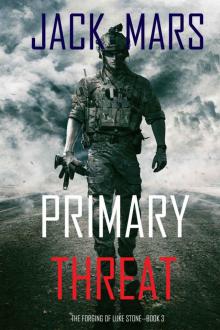 Primary Threat
Primary Threat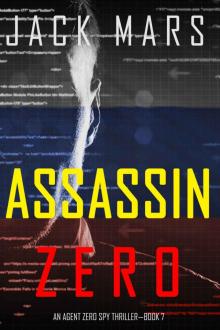 Assassin Zero
Assassin Zero Zero Zero
Zero Zero Zero Zero (An Agent Zero Spy Thriller—Book #11)
Zero Zero (An Agent Zero Spy Thriller—Book #11)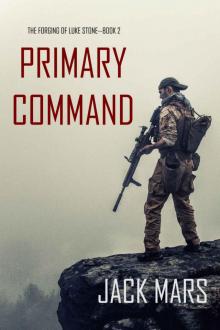 Primary Command
Primary Command![[Luke Stone 02.0] Oath of Office Read online](http://i1.bookreadfree.com/i/03/21/luke_stone_02_0_oath_of_office_preview.jpg) [Luke Stone 02.0] Oath of Office
[Luke Stone 02.0] Oath of Office House Divided
House Divided Oath of Office (a Luke Stone Thriller—Book #2)
Oath of Office (a Luke Stone Thriller—Book #2) Our Sacred Honor (A Luke Stone Thriller—Book 6)
Our Sacred Honor (A Luke Stone Thriller—Book 6)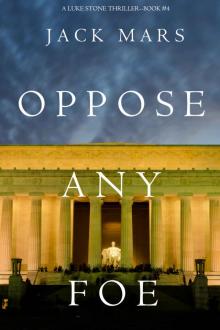 Luke Stone 04 - Oppose Any Foe
Luke Stone 04 - Oppose Any Foe Our Sacred Honor
Our Sacred Honor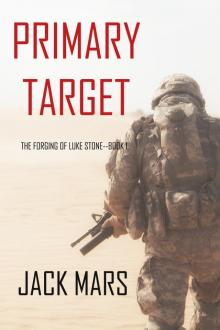 Primary Target
Primary Target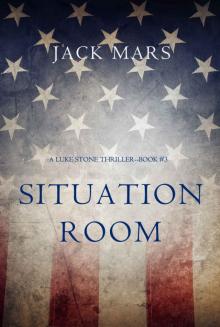 Luke Stone 03 - Situation Room
Luke Stone 03 - Situation Room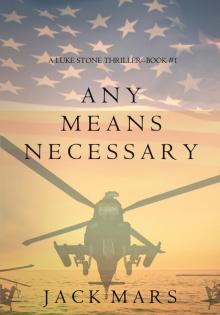 Any Means Necessary: A Luke Stone Thriller (Book 1)
Any Means Necessary: A Luke Stone Thriller (Book 1) Oath of Office
Oath of Office